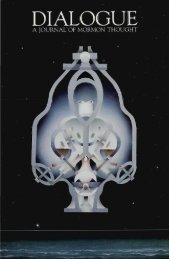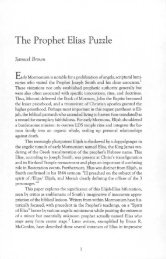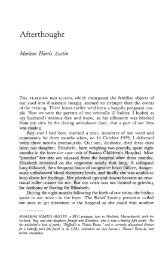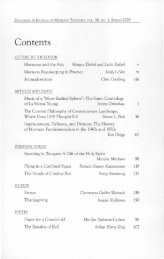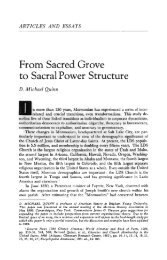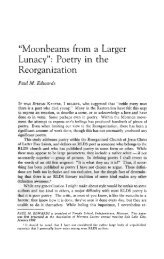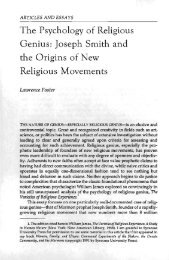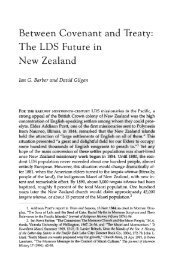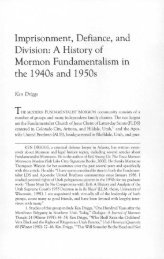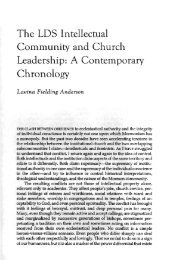Dialogue, Volume 25, Number 2 - Dialogue – A Journal of Mormon ...
Dialogue, Volume 25, Number 2 - Dialogue – A Journal of Mormon ...
Dialogue, Volume 25, Number 2 - Dialogue – A Journal of Mormon ...
You also want an ePaper? Increase the reach of your titles
YUMPU automatically turns print PDFs into web optimized ePapers that Google loves.
116 DIALOGUE: A JOURNAL OF MORMON THOUGHT<br />
That quote accurately sums up my feelings. I don't think I'll ever make<br />
complete sense <strong>of</strong> suffering or comprehend the intricacies <strong>of</strong> priesthood<br />
blessings —and I desperately want to make sense <strong>of</strong> those things.<br />
I want tidy answers to theological paradoxes. I relish spirited religious<br />
debate and feel compelled to write letters to authority figures when I<br />
perceive injustices in my Church. However, no longer do I think criticism<br />
<strong>of</strong> Church leaders (constructive though it may be) or vociferous<br />
opposition to them will ultimately effect changes. What I have learned<br />
dealing with multiple sclerosis convinces me that I must learn to truly<br />
accept and even celebrate life's delicious ambiguities, injustices, and<br />
imponderables.<br />
I feel with Kushner that looking for answers means looking at<br />
what we mean by "answers":<br />
If we mean "is there an explanation which will make sense <strong>of</strong> it all?" — why is<br />
there cancer in the world? Why did my father get cancer? Why did the plane<br />
crash? Why did my child die? —then there is probably no satisfying answer. We<br />
can <strong>of</strong>fer learned explanations, but in the end, when we have covered all the<br />
squares on the game board and are feeling very proud <strong>of</strong> our cleverness, the pain<br />
and the anguish and the sense <strong>of</strong> unfairness will still be there.<br />
But the word "answer" can mean "response" as well as "explanation," and in<br />
that sense, there may well be a satisfying answer to the tragedies in our lives. The<br />
response would be ... to forgive the world for not being perfect, to forgive God<br />
for not making a better world, to reach out to the people around us, and to go on<br />
living despite it all. ... I think <strong>of</strong> ... all that . . . life taught me, and I realize<br />
how much I have lost and how much I have gained. Yesterday seems less painful,<br />
and I am not afraid <strong>of</strong> tomorrow. (1981, 147-48)<br />
My hope and prayer and blessing for all <strong>of</strong> you is that you can<br />
look ahead with optimism, forgiveness, and love. And I bless you that,<br />
difficult as it may be at times, you can savor the ambiguity that life<br />
holds in store.<br />
BIBLIOGRAPHY<br />
Kushner, Harold S. When Bad Things Happen to Good People. New York: Avon Books,<br />
1981.<br />
. Who Needs God. New York: Summit Books, 1989.<br />
Radner, Gilda. It's Always Something. New York: Simon & Schuster, 1989.<br />
Siegel, Bernie. Peace, Love, and Healing. New York: Harper & Row, 1989.



